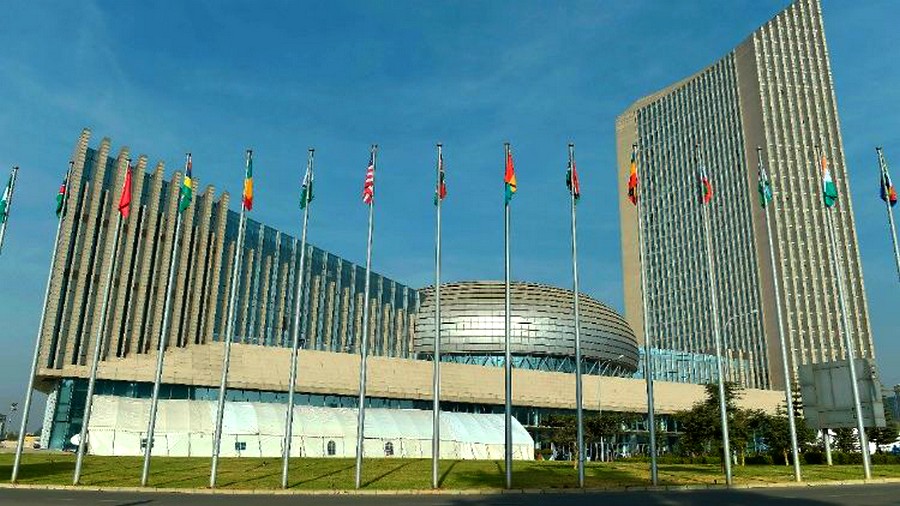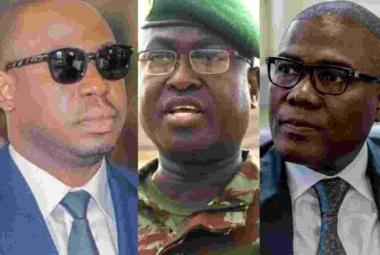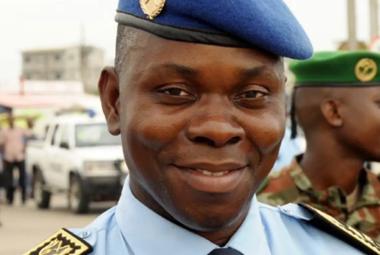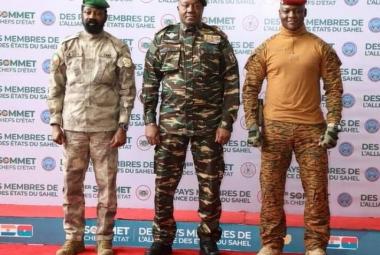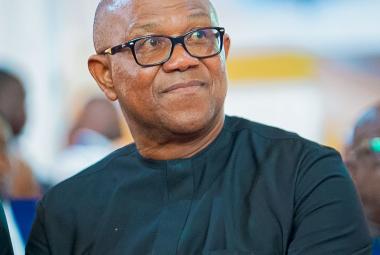Except for the repeal of certain texts of the former Organization of African Unity (OAU) which has become the African Union (AU) – for which proof and motive must be provided – the provisions are very clear concerning mercenary activity. and the use of mercenaries in Africa. As stated in the Declaration made in Libreville, Gabon, on July 3, 1977.
ORGANIZATION OF AFRICAN UNITY
CM/817 (XXIX) Annex II Rev.1
CONVENTION FOR THE ELIMINATION OF MERCENARISM IN AFRICA
PREAMBLE
We, the Heads of State and Government of the Member States of the Organization of African Unity;
Considering the grave threat which the activities of mercenaries present to the independence, sovereignty, security, territorial integrity and harmonious develop ment of Member States of the Organization of African Unity;
Concerned with the threat which the activities of mercenaries pose to the legiti mate exercise of the right of African people under colonial and racist domination to their independence and freedom;
Convinced that total solidarity and co-operation between Member States are in dispensable for putting an end to the subversive activities of mercenaries in Africa;
Considering that the resolutions of the UN and the OAU, the statements of attitude and the practice of a great number of States are indicative of the development of new rules of international law making mercenarism an international crime;
Determined to take all necessary measures to eliminate from the African continent the scourge that mercenarism represents;
Have agreed as follows:
Article 1. DEFINITION
1. A mercenary is any person who:
a) Is specially recruited locally or abroad in order to fight in an armed conflict;
b) Does in fact take a direct part in the hostilities;
c) Is motivated to take part in the hostilities essentially by the desire for private gain and in fact is promised by or on behalf of a party to the conflict material compensation;
d) Is neither a national of a party to the conflict nor a resident of territory controlled by a party to the conflict;
e) Is not a member of the armed forces of a party to the conflict; and
f) Is not sent by a State other than a party to the conflict on official mission as a member of the armed forces of the said State.
2. The crime of mercenarism is committed by the individual, group or association, representative of a State or the State itself who with the aim of opposing by armed violence a process of self-determination stability or the territorial integrity of another State, practises any of the following acts:
a) Shelters, organises, finances, assists, equips, trains, promotes, supports or in any manner employs bands of mercenaries;
b) Enlists, enrols or tries to enrol in the said bands;
c) Allows the activities mentioned in paragraph (a) to be carried out in any territory under its jurisdiction or in any place under its control or affords facilities for transit, transport or other operations of the above mentioned forces.
3. Any person, natural or juridical who commits the crime of mercenarism as defined in paragraph 1 of this Article commits an offence considered as a crime against peace and security in Africa and shall be punished as such.
Article 2. AGGRAVATING CIRCUMSTANCE
The fact of assuming command over or giving orders to mercenaries shall be considered as an aggravating circumstance.
Article 3. STATUS OF MERCENARIES
Mercenaries shall not enjoy the status of combatants and shall not be entitled to the prisoners of war status.
Article 4. SCOPE OF CRIMINAL RESPONSIBILITY
A mercenary is responsible both for the crime of mercenarism and all related offences, without prejudice to any other offences for which he may be prosecuted.
Article 5. GENERAL RESPONSIBILITY OF STATES AND THEIR REPRESENTATIVES
1. When the representative of a State is accused by virtue of the provisions of
Article 1 of this Convention for acts or omissions declared by the aforesaid article to
be criminal, he shall be punished for such an act or omission.
2. When a State is accused by virtue of the provisions of Article 1 of this Convention for acts or omissions declared by the aforesaid article to be criminal, anyother party to the present Convention may invoke the provisions of this Conventionin its relations with the offending State and before any competent OAU or International Organization tribunal or body.
Article 6. OBLIGATIONS OF STATES
The contracting parties shall take all necessary measures to eradicate all mercenary activities in Africa.
To this end, each contracting State shall undertake to:
a) Prevent its nationals or foreigners on its territory from engaging in any of the acts mentioned in Article 1 of this Convention;
b) Prevent entry into or passage through its territory of any mercenary or any equipment destined for mercenary use;
c) Prohibit on its territory any activities by persons or organisations who use mercenaries against any African State member of the Organization of African Unity or the people of Africa in their struggle for liberation;
98 United Nations — Treaty Series • Nations Unies — Recueil des Traités 1988
d) Communicate to the other Member States of the Organization of African Unity either directly or through the Secretariat of the OAU any information related to the activities of mercenaries as soon as it comes to its knowledge;
e) Forbid on its territory the recruitment, training, financing and equipment of mercenaries and any other form of activities likely to promote mercenarism;
f) Take all the necessary legislative and other measures to ensure the immediate entry into force of this Convention.
Article 7. PENALTIES
Each contracting State shall undertake to make the offence defined in Article 1 of this Convention punishable by severest penalties under its laws, including capital punishment.
Article 8. JURISDICTION
Each contracting State shall undertake to take such measures as may be necessary to punish, in accordance with the provisions of Article 7, any person who commits an offence under Article 1 of this Convention and who is found on its territory if it does not extradite him to the State against'which the offence has been committed.
Article 9. EXTRADITION
1. The crimes defined in Article 1 of this Convention, are not covered by national legislation excluding extradition for political offences.
2. A request for extradition shall not be refused unless the requested State undertakes to exercise jurisdiction over the offender in accordance with the provisionsof Article 8.
3. Where a national is involved in the request for extradition, the requested
State shall take proceedings against him for the offence committed if extradition is refused.
4. Where proceedings have been initiated in accordance with paragraphs 2 and 3 of this Article, the requested State shall inform the requesting State or any other State member of the OAU interested in the proceedings, of the result thereof.
5. A State shall be deemed interested in the proceedings within the meaning of paragraph 4 of this Article if the offence is linked in any way with its territory or is directed against its interests.
Article 10. MUTUAL ASSISTANCE
The contracting States shall afford one "another the greatest measures of assistance in connection with the investigation and criminal proceedings brought in respect of the offence and other acts connected with the activities of the offender.
Article 11. JUDICIAL GUARANTEE
Any person or group of persons on trial for the crime defined in Article 1 of this Convention shall be entitled to all the guarantees normally granted to any ordinary person by the State on whose territory is being tried.
Article 12. SETTLEMENT OF DISPUTES
Any dispute regarding the interpretation and application of the provisions of this Convention shall be settled by the interested parties in accordance with the principle of the Charter of the Organization of African Unity 1 and the Charter of the United Nations.
Article 13. SIGNATURE, RATIFICATION AND ENTRY INTO FORCE
1. This Convention shall be open for signature by the Members of the Organization of African Unity. It shall be ratified. The instruments of ratification shall be deposited with the Administrative Secretary-General of the Organization.
2. This Convention shall come into force 30 days after the date of the deposit of the seventeenth instrument of ratification.
3. As regards any signatory subsequently ratifying the Convention, it shall come into force 30 days after the date of the deposit of its instrument of ratification.
Article 14. ACCESSION
1. Any Member State of the Organization of African Unity may accede to this Convention.
2. Accession shall be by deposit with the Administrative Secretary-General of the Organization of an instrument of accession, which shall take effect 30 days after the date of its deposit.
Article 15. NOTIFICATION AND REGISTRATION
1. The Administrative Secretary-General of the Organization of African Unity shall notify the Member States of the Organization of:
a) The deposit of any instrument of ratification or accession;
b) The date of entry into force of this Convention.
2. The administrative Secretary-General of the Organization of African Unityshall transmit certified copies of the Convention to all Member States of the Organization.
3. The Administrative Secretary-General of the Organization of African Unity shall, as soon as this Convention comes into force, register it pursuant to Article 102 of the Charter of the United Nations.
IN WITNESS WHEREOF, We, the Heads of State and Government of the Member States of the Organization of African Unity have appended our signatures to this Convention.
DONE at Libreville (Gabon) this 3rd day of July 1977 in the Arabic, English and French languages, all texts being equally authoritative, in a single original copy which shall be deposited in the archives of the Organization of African Unity.
A little bit of history for memory
On January 16, 1977, the French mercenary Bob Denard, who we know for having raged in particular in the Comoros, landed in Cotonou in Benin to overthrow the Marxist-Leninist regime of President Mathieu Kérékou. On the official site of the Government of Benin, we can also read: "The defense and security forces of Benin are not ready to forget the aggression that occurred on January 16, 1977. Indeed, that day, a group of mercenaries armed to the teeth land on the tarmac of Cotonou international airport. At the controls of this operation, a certain Bob Denard, author of numerous feats of arms in Africa. The attackers invested strategic points in Cotonou. The Ghézo camp, the Palais de la Marina among others.
Despite the loss of human life deplored in their ranks, the Beninese thus succeeded in shattering the destabilizing dream of the mercenaries, defeating their disastrous intention”.
Without going into details, the Gabon of President Ormar Bongo Odimba (then Albert Bernard Bongo) just like the Morocco of King Hassan II were in collusion with France which, through Bob Denard, tried to overthrow General Mathieu Kérékou and his People's Revolutionary Party of Benin (PRPB) in Cotonou. Not without the collusion and participation of President Emile-Derlin Zinsou and many Beninese opponents in exile. A situation that had led to a diplomatic rupture between Benin and the two countries involved, Gabon and Morocco.
We remember that during a Summit, following this event, President Mathieu Kérékou threatened Omar Bongo frontally and directly by showing him with his magic cane, he said. Which Omar Bongo hastened to expel the Beninese from Gabon. Consequence of this failed coup: the aforementioned Libreville Declaration. It was only many years later that the various heads of state will iron out this dispute which had cast a great chill in their relations. As such, for example, King Hassan II will be one of the biggest contributors to the presidential campaign for the return to power of General Mathieu Kérékou in 2016 alongside Presidents Gnassingbé Eyadema of Togo and José Eduardo dos Santos of Angola.
Why Wagner Group and not "Buffalo Group" or others?...
How is it possible to ban the “Buffalo Battalion” or “Buffalo Group” which is an African Company and let Wagner which is a Russian Company quietly carry out its mercenary activities in Africa. Starting with the Central African Republic where he came purely and simply to take the place of the South African mercenaries who worked on behalf of former President François Bozizé? The question deserves to be asked of the African Union and South Africa.
While waiting for the answer, it is clear that apart from the coup d'Etat in Mali and Guinea under popular pressure, those of Burkina Faso and Niger are originally intimately linked to the Wagner Group. What the hell was the famous Peace and Security Council of the African Union doing when this nebula was taking hold! And now he can quibble about whether or not the Economic Community of West African States (ECOWAS) should intervene at will. ECOWAS would not have had to deal with the current coup spiral in West Africa if the AU had exercised its authority properly upstream. By enforcing its own texts and laws, were it against a great power like Russia, we would most certainly not be where we are today. In any case, not with Wagner pulling the strings and puppets who take themselves for Che Guevara or Thomas Sankara.
By denouncing the coup d'Etat perpetrated in Niger, as said on August 20, 2023 in the program "De vous à Nous" ("From you to us") of Radio Peace FM, Professor Théodore Holo, former President of the Constitutional Court and former Minister of Benin Republic: "the military are not trained to lead a Republic. They are trained to defend and guarantee the integrity of the territory (…) the military have no legitimacy to pose as arbiters…, when a soldier considers that he has ideas that can help his country progress, he resigns from the army, creates his own political party or he is a candidate in a presidential election". Duly acknowledged!
By Marcus Boni Teiga



